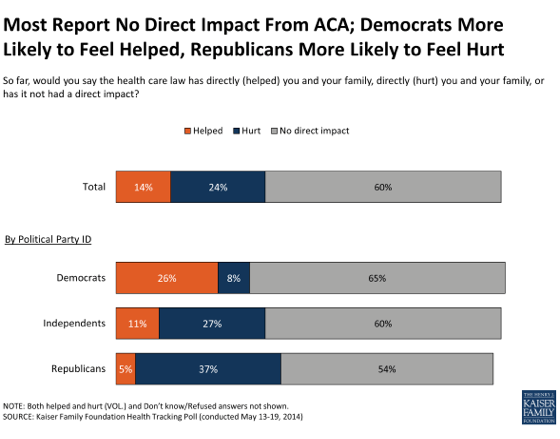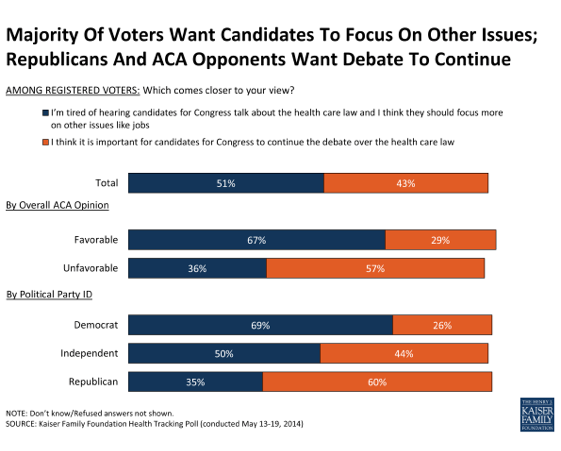
A new Kaiser poll finds more feel harmed than helped by the ACA, but most wish politicians would move on to something else. The Santa Barbara shootings have done little to alter attitudes on gun laws. And, yes, we're still fans of poll aggregation. This is HuffPollster for Friday, May 30, 2014.
FEW AMERICANS FEEL AFFECTED BY ACA - Liz Hamel, Jamie Firth and Mollyann Brodie: "The latest Kaiser Health Tracking Poll finds that more than four years after the passage of the Affordable Care Act (ACA) and several months into the first year of its coverage expansions, most Americans do not feel personally impacted by the law. Among the minority who say they have felt an impact, more feel they have been harmed than helped by the law, with Republicans more likely to say they have been hurt and Democrats more likely to say they have been helped." [KFF]
...but most would like politicians to stop talking about it - Kaiser: "Six months out from the 2014 midterm election and in the midst of primary battles in many states, the ACA is already a frequent topic of political conversation and the subject of an abundance of campaign advertising. Even at this early stage, about half of registered voters (51 percent) say they are tired of hearing candidates for Congress talk about the health care law and want them to focus more on other issues like jobs, while a smaller share (43 percent) want candidates to continue debating the law. A familiar partisan divide is evident, with about seven in ten Democratic voters saying they’d rather hear candidates discuss other issues and six in ten Republican voters saying it’s important to keep up the debate. Independents are more split, with half saying they’re tired of hearing about it and 44 percent wanting the debate to go on. Looked at another way, two-thirds of voters who view the ACA favorably say they want candidates to focus on other issues, while almost six in ten of those who have an unfavorable view of the law want debate to continue."
Similar findings from Gallup - Frank Newport: "About one month after the new healthcare exchanges closed with over 8 million new enrollees, there has been little substantial change in Americans' perception that the healthcare law has helped them. Most Americans say the law has had no impact on their healthcare situation, while those who do perceive an effect are more likely to say it has hurt them rather than helped them. The majority of Americans have reported that the Affordable Care Act has had little effect on their personal situations since Gallup first asked this question in early 2012. In more recent months, after the exchange-based enrollment opened up, Americans have gradually become more likely to indicate that the law has had an effect -- both positive and negative. The current 24% who say the law has hurt them is by one percentage point the highest measured, while the 14% who say the law has helped them is also within one point of being the highest measured on that dimension. In all instances, across seven different surveys, Americans have been at least marginally more likely to say the law has hurt them and their families than to say it has helped them.Americans' views on how the healthcare law has affected them personally are predictably partisan, as are almost all attitudes about Obamacare." [Gallup]
LITTLE CHANGE IN GUN CONTROL OPINIONS, BUT MOST SUPPORT SOME MEASURES - Emily Swanson: "Last week's killing spree in Santa Barbara, California, has had little impact on Americans' overall support for stricter gun laws, a new HuffPost/YouGov poll has found. But most continue to support universal background checks, as well as new measures, to keep guns out of the hands of mentally ill people. According to the new poll, 49 percent of Americans want gun laws made more strict, while 27 percent want no change and 18 percent want them to be less strict. Support for stricter gun laws peaked at 60 percent in January of 2013, shortly after the Newtown school shooting. That support fell back toward 50 percent by the end of the year and has remained steady at that level since then, with other mass shootings having made little difference in Americans' support for tightening restrictions. Support for universal background checks, however, remains high. Americans favor requiring background checks for all gun sales, including at gun shows and for private sales, by a margin of 79 percent to 12 percent. And most support tough measures to keep guns out of the hands of mentally ill people, even if it means allowing states to take guns from those who already own them. By a 54 percent to 23 percent margin, respondents to the poll said that they favor allowing states to confiscate guns owned by mentally ill people, including individuals who have never been committed into psychiatric care." [HuffPost]
HOW AGGREGATION HELPS COMBAT THE FLAWS OF INDIVIDUAL POLLS - Jonathan Bernstein: " As readers, we should simply pay as little attention as possible to individual surveys and instead just look at polling averages. In fact, looking under the hood may be the wrong way to go. It may make for an interesting story, but unless the answer points to fraud (not the case here), it doesn’t really matter why any particular pollster gets it wrong. What matters is whether they are systematically biased in any predictable way. Poll averagers have two tools to deal with this. If a pollster systematically favors one party, that will create a house effect that can be adjusted for. If, on the other hand, a pollster is all over the place with no particular consistency, averagers then can employ a weighting scheme to downplay that outfit’s results….We’re all prone to cherry-picking when it comes to polls, and partisans on both sides will always be able to'unskew' any particular survey. Ignore those unskewers and keep the focus on polling averages. [Bloomberg]
On that note… - HuffPost Pollster currently has charts on more than 30 Senate and gubernatorial matchups. Use the "Find a chart" search bar at the top of the page to find data on any of the races we're tracking. [HuffPollster]
WHY ARE MORE LATINOS IDENTIFYING AS WHITE ON THE CENSUS? - Manuel Pastor: "2.5 million Americans who marked Hispanic and 'some other race' in 2000 indicated that they were Hispanic and white a decade later; while another 1.3 million people flipped the other way, it's still a large net gain -- about 3.5 percent of the Latino population in the year 2000. So what happened?...In general, the Census asks two general questions: First, are you Hispanic? And second, what race are you? There's also a specific admonition to the respondent to answer both the questions being asked. And what was different in 2010 was the inclusion of a line -- in bold type -- saying, 'For this census, Hispanic origins are not races.' The addition of that phrase could have pushed Latinos into skipping the 'other' category and choosing one of the predefined groups -- sort of like whitening through reworking the data rather than the reality. That was, in fact, part of the motivation: The Census wanted what it thought would be a more accurate race count." [HuffPost]
HUFFPOLLSTER VIA EMAIL! - You can receive this daily update every weekday via email! Just click here, enter your email address, and and click "sign up." That's all there is to it (and you can unsubscribe anytime).
FRIDAY'S 'OUTLIERS' - Links to the best of news at the intersection of polling, politics and political data:
-Rasmussen gives Mitch McConnell a 7-point lead. [Rasmussen]
-Harper (R) finds incumbent Thad Cochran narrowly leading Mississippi's Senate GOP primary. [Harper]
-Civitas (R) finds a close race between Thom Tillis (R) and Kay Hagan (D) in North Carolina. [Citizen-Times]
-David Nir flags an arguably leading question asked just before the vote in the Civitas poll. [DailyKos]
-Republicans and Democrats remain deeply divided on what's considered "morally acceptable." [HuffPost]
-Harry Enten predicts a messy three-person race for New York governor. [538]
-Amy Walter says Republicans have fixed their "messenger" problem, but need to give voters more than anger in 2014. [Cook Political]
-Brendan Nyhan notes voters are more worried by a candidate's age when they're from an opposing party. [NYT]
-Elizabeth Wilner finds that Republican television advertising has shifted away from bashing Obamacare and calling for its repeal. [CookPolitical]
-John & Jim McLaughlin (R) sees a turn toward another tsunami for the Republicans in 2014. [National Review]
-Obama's data gurus celebrate life outside the beltway. [CNBC]
-Drew DeSilver offers up five facts about today's college graduates. [Pew Research]
-Most Americans think gay couples should be able to adopt children. [Gallup]

